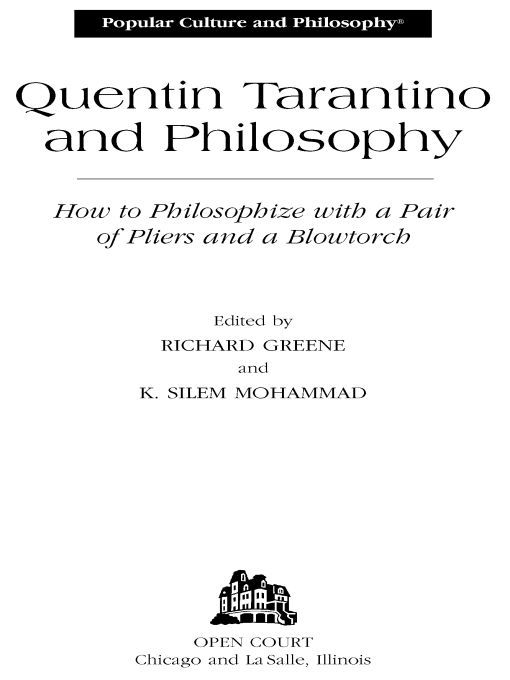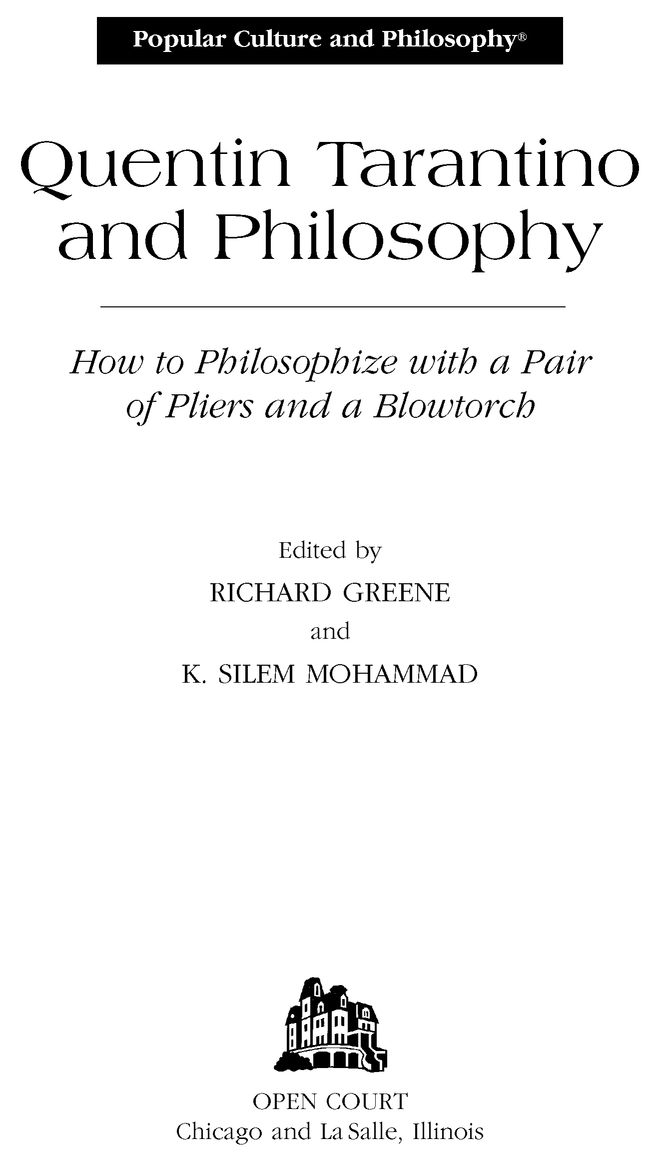Quentin Tarantino and Philosophy
Read Quentin Tarantino and Philosophy Online
Authors: Richard Greene,K. Silem Mohammad
Tags: #Philosophy, #Non-Fiction


Table of Contents
Popular Culture and Philosophy
®
Series Editor: George A. Reisch
®
Series Editor: George A. Reisch
VOLUME 1
Seinfeld and Philosophy: A Book about Everything and Nothing
(2000)
(2000)
VOLUME 2
The Simpsons and Philosophy: The D’oh! of Homer
(2001)
(2001)
VOLUME 3
The Matrix and Philosophy: Welcome to the Desert of the Real
(2002)
(2002)
VOLUME 4
Buffy the Vampire Slayer and Philosophy: Fear and Trembling in Sunnydale
(2003)
(2003)
VOLUME 5
The Lord of the Rings and Philosophy: One Book to Rule Them All
(2003)
(2003)
VOLUME 6
Baseball and Philosophy: Thinking Outside the Batter’s Box
(2004)
(2004)
VOLUME 7
The Sopranos and Philosophy: I Kill Therefore I Am
(2004)
(2004)
VOLUME 8
Woody Allen and Philosophy: You Mean My Whole Fallacy Is Wrong?
(2004)
(2004)
VOLUME 9
Harry Potter and Philosophy: If Aristotle Ran Hogwarts
(2004)
(2004)
VOLUME 10
Mel Gibson’s Passion and Philosophy: The Cross, the Questions, the Controversy
(2004)
(2004)
VOLUME 11
More Matrix and Philosophy: Revolutions and Reloaded Decoded
(2005)
(2005)
VOLUME 12
Star Wars and Philosophy: More Powerful than You Can Possibly Imagine
(2005)
(2005)
VOLUME 13
Superheroes and Philosophy: Truth, Justice, and the Socratic Way
(2005)
(2005)
VOLUME 14
The Atkins Diet and Philosophy: Chewing the Fat with Kant and Nietzsche
(2005)
(2005)
VOLUME 15
The Chronicles of Narnia and Philosophy: The Lion, the Witch, and the Worldview
(2005)
(2005)
VOLUME 16
Hip Hop and Philosophy: Rhyme 2 Reason
(2005)
(2005)
VOLUME 17
Bob Dylan and Philosophy: It’s Alright Ma (I’m Only Thinking)
(2006)
(2006)
VOLUME 18
Harley-Davidson and Philosophy:
Full-Throttle Aristotle
(2006) Edited by Bernard E. Rollin, Carolyn M. Gray, Kerri Mommer, and Cynthia Pineo
(2006) Edited by Bernard E. Rollin, Carolyn M. Gray, Kerri Mommer, and Cynthia Pineo
VOLUME 19
Monty Python and Philosophy: Nudge Nudge, Think Think!
(2006) Edited by Gary L. Hardcastle and George A Reisch
(2006) Edited by Gary L. Hardcastle and George A Reisch
VOLUME 20
Poker and Philosophy: Pocket Rockets and Philosopher Kings
(2006) Edited by Eric Bronson
(2006) Edited by Eric Bronson
VOLUME 21
U2 and Philosophy: How to Decipher an Atomic Band
(2006) Edited by Mark A. Wrathall
(2006) Edited by Mark A. Wrathall
VOLUME 22
The Undead and Philosophy: Chicken Soup for the Soulless
(2006) Edited by Richard Greene and K. Silem Mohammad
(2006) Edited by Richard Greene and K. Silem Mohammad
VOLUME 23
James Bond and Philosophy: Questions Are Forever
(2006) Edited by James B. South and Jacob M. Held
(2006) Edited by James B. South and Jacob M. Held
VOLUME 24
Bullshit and Philosophy: Guaranteed to Get Perfect Results Every Time
(2006) Edited by Gary L. Hardcastle and George A. Reisch
(2006) Edited by Gary L. Hardcastle and George A. Reisch
VOLUME 25
The Beatles and Philosophy: Nothing You Can Think that Can’t Be Thunk
(2006) Edited by Michael Baur and Steven Baur
(2006) Edited by Michael Baur and Steven Baur
VOLUME 26
South Park and Philosophy: Bigger, Longer, and More Penetrating
(2007) Edited by Richard Hanley
(2007) Edited by Richard Hanley
VOLUME 27
Hitchcock and Philosophy: Dial M for Metaphysics
(2007) Edited by David Baggett and William A. Drumin
(2007) Edited by David Baggett and William A. Drumin
VOLUME 28
The Grateful Dead and Philosophy: Getting High Minded about Love and Haight
(2007) Edited by Steven Gimbel
(2007) Edited by Steven Gimbel
VOLUME 29
Quentin Tarantino and Philosophy: How to Philosophize with a Pair of Pliers and a Blowtorch
(2007) Edited by Richard Greene and K. Silem Mohammad
(2007) Edited by Richard Greene and K. Silem Mohammad
VOLUME 30
Pink Floyd and Philosophy: Careful with that Axiom, Eugene!
(2007) Edited by George A. Reisch
(2007) Edited by George A. Reisch
IN PREPARATION:
Johnny Cash and Philosophy
(2008) Edited by John Huss and David Werther
(2008) Edited by John Huss and David Werther
Bruce Springsteen and Philosophy
(2008) Edited by Randall E. Auxier and Doug Anderson
(2008) Edited by Randall E. Auxier and Doug Anderson
Battlestar Galactica and Philosophy
(2008) Edited by Josef Steiff and Tristan D. Tamplin
(2008) Edited by Josef Steiff and Tristan D. Tamplin
The Legend of Zelda and Philosophy
(2008) Edited by Luke Cuddy
(2008) Edited by Luke Cuddy
Star Trek and Philosophy
(2008) Edited by Jason T. Eberl and Kevin S. Decker
(2008) Edited by Jason T. Eberl and Kevin S. Decker
iPod and Philosophy
(2008) Edited by Dylan E. Wittkower
(2008) Edited by Dylan E. Wittkower
The Wizard of Oz and Philosophy
(2008) Edited by Randall E. Auxier and Phil Seng
(2008) Edited by Randall E. Auxier and Phil Seng

For Dan, Lisa, Lori, and Wade
Acknowledgments
Working on this project has been a pleasure, in no small part because of the many fine folks who have assisted us along the way. In particular a debt of gratitude is owed to George Reisch and David Ramsay Steele at Open Court, the contributors to this volume (each of whom agreed to produce top-notch work at a highly accelerated pace), and our respective academic departments at Southern Oregon University and Weber State University (Terry Thiel has been particularly supportive). Finally, we’d like to thank those students, friends, and colleagues with whom we’ve had fruitful and rewarding conversations on various aspects of Tarantino’s work in relation to philosophical themes.
Let’s Go to Woik
Quentin Tarantino makes the most aggressively reflexive films in contemporary mainstream cinema. From dialogue about Madonna, Lee Marvin, and the Fantastic Four in 1992’s
Reservoir Dogs
, to the Seventies retro pastiche of 2007’s
Death Proof
, Tarantino’s movies are obsessed with pointing self-consciously to their own knowledge of the position they occupy among the disposable (but infinitely recyclable) entertainments of American pop culture.
Reservoir Dogs
, to the Seventies retro pastiche of 2007’s
Death Proof
, Tarantino’s movies are obsessed with pointing self-consciously to their own knowledge of the position they occupy among the disposable (but infinitely recyclable) entertainments of American pop culture.
Other books
Not Looking for Love: Episode 4 by Bourne, Lena
Unsure by Ashe Barker
Flaming Desire - Part 1 (An Alpha Billionaire Romance) by Grey, Helen
Defender: A Terran Times Tale by Viola Grace
Bad Moon Rising by Loribelle Hunt
Kolchak's Gold by Brian Garfield
Voices From S-21: Terror and History in Pol Pot's Secret Prison by David P. Chandler
Beyond the Occult by Colin Wilson
Moon Palace by Paul Auster
Bound to Them by Roberts, Lorna Jean